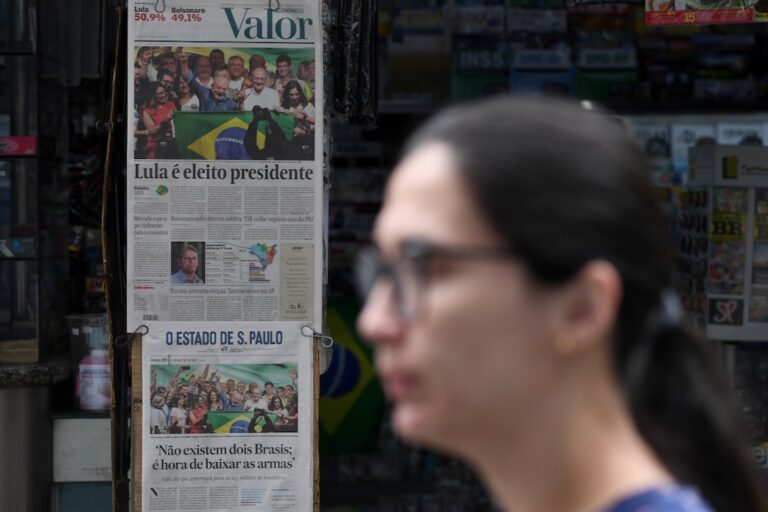(RSF/IFEX) – The following is a 3 October 2002 RSF press release: BRAZIL General elections to be held on 6 October Reporters Without Borders calls on all candidates to oppose impunity in the killing of journalists A new report by the organisation concludes that the federal authorities should be in charge of investigating such killings […]
(RSF/IFEX) – The following is a 3 October 2002 RSF press release:
BRAZIL
General elections to be held on 6 October
Reporters Without Borders calls on all candidates to oppose impunity in the killing of journalists
A new report by the organisation concludes that the federal authorities should be in charge of investigating such killings
On the eve of Brazil’s presidential and parliamentary elections of 6 October, Reporters Without Borders calls on all candidates to oppose the impunity enjoyed by those who kill journalists. The organisation, which defends press freedom throughout the world, recently sent a fact-finding mission to the northeastern state of Bahia. Based on its findings, it urges candidates to undertake to adopt a proposed judicial reform that would put the federal authorities in charge of investigating the murders of journalists.
TV Globo’s Tim Lopes, killed on 2 June, and Savio Brandão of the “Folha do Estado” daily newspaper, killed on 30 September, are just the latest in a total of 15 journalists slain in Brazil since 1991. To find out why almost all of these murders remain unpunished, Reporters Without Borders sent a fact-finding mission to the state of Bahia, where 10 journalists were killed during the 1990s. This inquiry was carried out jointly with the Damocles Network, which combats impunity and is the judicial arm of Reporters Without Borders.
Entitled “Bahia: culture of impunity?”. the report (available on www.rsf.org) looks at the official investigation into the murder of Manuel Leal de Oliveira, editor-in-chief of “A Região”, a weekly published in Itabuna. Leal was gunned down on 14 January 1998 after having targeted Itabuna Mayor Fernando Gomes, an ally of former state governor d’Antonio Carlos Magalhães, the head of the Liberal Front Party (PFL).
“The Leal case above all exposes the limits of a system which puts a police force controlled by locally elected officials – in this case, the state of Bahia’s civilian police – in charge of investigating the murder of a journalist who had targeted one of these elected officials,” the Reporters Without Borders/Damocles Network report concludes.
The two organisations state, “The lack of convictions in the nine other murders of journalists in Bahia during the 1990s raises questions about the existence of an autocratic political system that allowed the ruling party’s elected officials, with little difficulty, to ‘eliminate’ journalists who set about exposing their financial skullduggery.”
According to the report, “The first few months of the investigation by the state of Bahia civilian police could have come from a textbook on impunity… The case was closed in September 1998 without any suspect ever having been arrested and without Mayor Gomes even having been questioned.” Judicial proceedings were reopened in May 2000, following revelations in the regional daily newspaper “A Tarde”. Despite judicial requests for specific additional investigative measures, there has been only very limited progress in the investigation since then.
In their recommendations, the two organisations call on candidates in the presidential and legislative elections to undertake to adopt a proposed change to the constitution involving reform of the judicial administration. The proposed reform includes the “federalisation” of judicial proceedings in any human rights crime or serious violation, including murders of journalists. This draft reform, which was passed by deputies in Brasilia on its first reading, would assign investigation of these cases to the federal police.
In the event that the three persons charged in the Leal murder are not brought to trial, or are acquitted, the two organisations warn in their report that they will fulfill their obligation to file a request with the Brazilian Justice Ministry’s Council for the Defence of the Rights of the Person (Conselho da Defesa dos Direitos da Pessoa Humana – CDDPH) for the investigation into this murder to be started all over again by the federal police.
Finally, Reporters Without Borders and the Damocles Network make a number of specific recommendations for State Prosecutor Marcos Bandeira, who is in charge of the case, Katia Alves, Bahia’s secretary for public security (the equivalent of interior minister at the state level), and the civilian police.
TV Globo’s Tim Lopes was killed on the night of 2 to 3 June while investigating the use of child prostitutes by drug traffickers in Vila del Cruzeiro, a shantytown on the outskirts of Rio de Janeiro. Savio Brandão, owner of the “Folha do Estado” daily newspaper in the state of Mato Grosso, was killed by two gunmen on a motorcycle on 30 September. He also owned a construction company.


